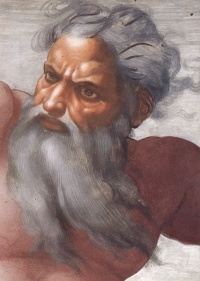Master
From The Art and Popular Culture Encyclopedia
(Difference between revisions)
| Revision as of 14:06, 24 January 2021 Jahsonic (Talk | contribs) ← Previous diff |
Current revision Jahsonic (Talk | contribs) |
||
| Line 4: | Line 4: | ||
| "[[No gods, no masters]]" | "[[No gods, no masters]]" | ||
| |} | |} | ||
| - | [[Image:God.jpg|thumb|right|200px|[[God the Father]]]]{{Template}} | + | {{Template}} |
| # someone who has [[control]] over something or someone | # someone who has [[control]] over something or someone | ||
| # owner of an [[animal]] or [[slave]] | # owner of an [[animal]] or [[slave]] | ||
| Line 13: | Line 13: | ||
| *[[Old master print]] | *[[Old master print]] | ||
| *[[Old Master]] | *[[Old Master]] | ||
| + | *[[Mastering (audio)]] | ||
| == Namesakes == | == Namesakes == | ||
| *"[[The Master's Tools Will Never Dismantle the Master's House]]" by Audre Lorde | *"[[The Master's Tools Will Never Dismantle the Master's House]]" by Audre Lorde | ||
Current revision
|
Related e |
|
Featured: |
- someone who has control over something or someone
- owner of an animal or slave
- an expert at something
- a skilled artist
[edit]
See also
[edit]
Namesakes
- "The Master's Tools Will Never Dismantle the Master's House" by Audre Lorde
- The Master and Margarita (1967) by Mikhail Bulgakov
- The Master (2012 film)
[edit]
Etymology
From Middle English maister, mayster, meister, from Old English mǣster, mæġster, mæġester, mæġister, magister (“master”), from Latin magister (“chief, teacher, leader”), from Old Latin magester, from mag- (as in magnus (“great”)) + -ester/-ister (compare minister (“servant”)). Reinforced by Old French maistre, mestre from the same Latin source.
Unless indicated otherwise, the text in this article is either based on Wikipedia article "Master" or another language Wikipedia page thereof used under the terms of the GNU Free Documentation License; or on research by Jahsonic and friends. See Art and Popular Culture's copyright notice.


